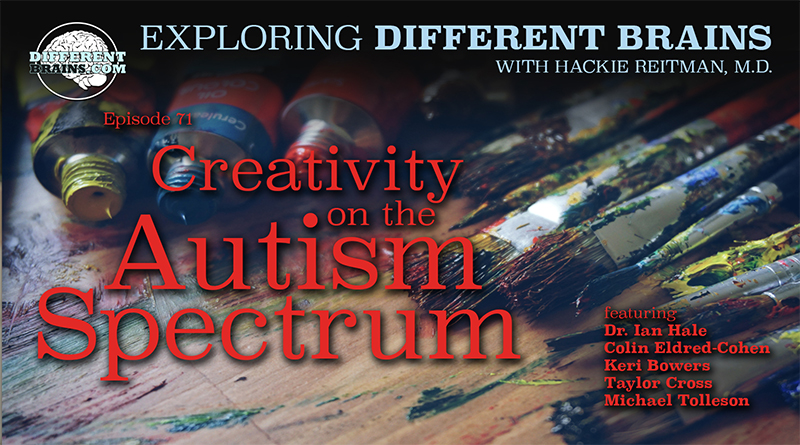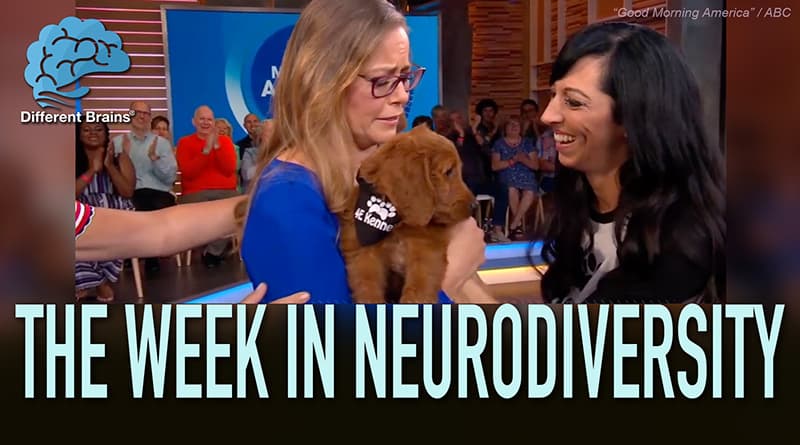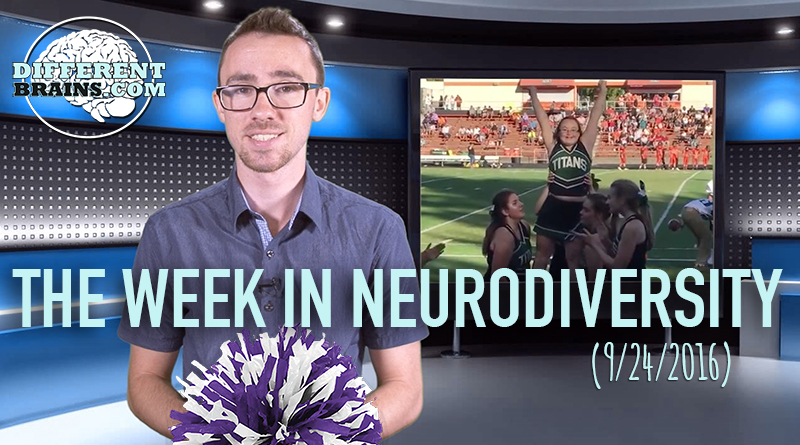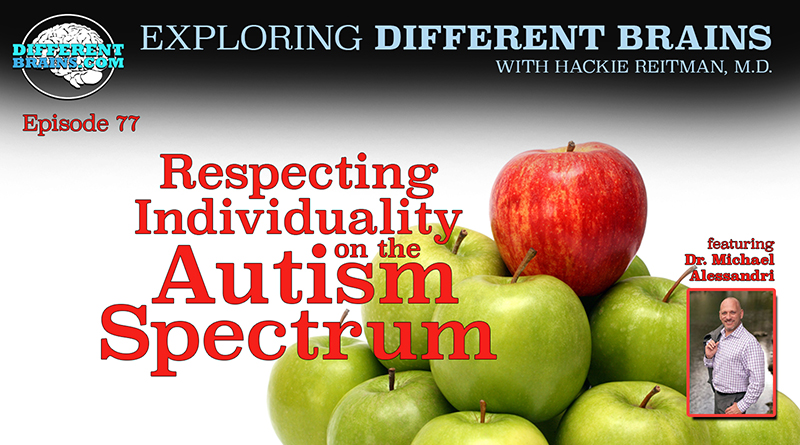
Creativity on the Autism Spectrum | EDB 71
In this special episode of Exploring Different Brains, Hackie Reitman, M.D. presents 5 previous guests discussing creative endeavors by those on the autism spectrum. Guests include: Dr. Ian Hale (a writer, poet, public speaker and researcher), Colin Eldred-Cohen (the author of “The Fire Truck Who Got Lost,” a movie reviewer, and a comedy writer), Keri Bowers and Taylor Cross (the mother and son directorial team of the films Normal People Scare Me and Normal People Scare Me Too), and Michael Tolleson (a savant artist that paints masterpieces in minutes, and mentors other artists on the spectrum).
48 Second Preview:
For the full interview with Dr. Ian Hale, click here for part 1 and here for part 2. For more information about his work, visit: ianchalephd.com
For the full interview with Colin Eldred-Cohen, click here. For more information about Colin’s work, visit www.fishandcherries.com
For the full interview with Keri Bowers and Taylor Cross, click here. To learn more about Normal People Scare Me and Normal People Scare Me Too visit: www.normalfilms.com
For the full interview with Michael Tolleson, click here. For more about Michael’s work, visit: www.michaeltollesonartist.com
To listen or download the podcast version of this episode, see the embedded player below.
Or look for us on your favorite podcast provider:
iTunes | Stitcher | SoundCloud
[expand title=”View Full Transcript”]
HACKIE REITMAN, M.D. (HR):
Hi I’m Dr. Hackie Reitman, welcome to a special episode of Exploring Different Brains. Today we’re going to explore the creativity of various individuals on the autism spectrum. Amazing how creative those of us whose brains are a little bit different can be. First we’re going to hear from Ian Hale, who lives some of the time in England some of the time in Spain. Ian is a real Renaissance man- he’s a poet he’s an author he’s a public speaker, he’s a researcher, and I think you’ll find them quite interesting.
HR:
Now, what I would like to know from you, for our audience, is how your different brain–let’s call it autistic or Asperger’s, or, as you say, Asperger’s, how does it affect your poetry?
IAN HALE, Ph.D. (IH):
100% if I wasn’t what I am, my poetry would be different. The first poetry book is called Emotional Exile, because that was the best title to describe my experience of being an aspie, of being Asperger’s syndrome. I’ve described the experience as like living inside a greenhouse. You can hear and see the way people are living and interacting and everything with each other, and the door is there, so you know, there is a little bit of communication, but, at the end of the day, you’re still an outsider, and that’s why I’ve called the book Emotional Exile. And the second book of poems is called Dance With the Desert. Dance with the Desert is more–is less autobiographical than Emotional Exile. It’s more wishful I think, and it’s more descriptive and it’s more about an actual world, as well as about my inner world, but also my experiences and what people have told me of their inner worlds, whether they be different brained people or not, it’s a gentler book than Emotional Exile, but they both have fantastic reviews from very important reviewers. One of them was kind enough to–an English girl in fact, for Dance with the Desert, compared me with Keats and T.S. Elliot I’ve already said, I’m extremely flattered. I’m currently trying to write the third of that intended trilogy, because the poetry books are supposed to be initially three, and I want to write a lot more poetry books.
HR:
I wanted to ask you what is one message that you would like all of our differentbrains.com viewers and listeners and readers–what is the one message that you, Dr. Ian Hale, would like to give them?
IH:
When you come across someone with a different brain, try to find out how they communicate best. It might be by–they might play you a song that expresses their feelings–they might do shadow puppeting on the wall that expresses their feelings–they might sing–I’m a great believer, for example, I think one of the things that is really helpful, as far as I’m concerned at least, is to sing in public. I mean I’m not saying it’s good, but it’s a wonderful hobby. It helps with self-expression. Some differently brained people will draw, and I’ve met a number of those who express themselves that way. The secret, and what I want to get out to everybody, is that we are different, not inferior–that autism is not a disease. There is no cure, it’s a different state of mind, it’s a different perspective of the world, and it’s as valid as anybody else’s, and that includes anyone with a different brain, whether they be bipolar, or schizophrenic, or Asperger’s, or whatever else it is, they see the world from a different angle. Respect that, learn from it, as they will learn from you. So the plea that I shout out to the world, listening, tolerating, communicating, sharing.
HR:
Next we’re going to hear from a talented young man: Colin Eldred-Cohen, who makes people laugh. He’s a comedian, he’s on the autism spectrum, and I remember first meeting him out in San Francisco at the AASCEND conference. He wants to help everyone whose brain might be a little bit different.
HR:
What are you writing?
COLIN ELRED-COHEN (CEC):
Mostly critical stuff, like reviews of movies and comics. I have an ongoing movie review the series called the “reel snippets” on my website fishandcherries.com, but I’m also writing op-ed pieces and well some fiction like the fire truck we got lost
HR:
How did you first decided to become a writer?
CEC:
I honestly don’t know if I ever decided. I think it was just always there. I always was i’ve been writing since preschool, just not all of it very good.
HR:
I have a chapter in my Aspertools book about how important it is to harness the hyper interests, some would call obsessions right. I tell everybody no matter what their brains like if you can if you’re lucky enough to find out what you really love and you can figure out how to make a living at it and if what you do also can help or make happy other people that’s the perfect trifecta you have a good time the rest of your life and you never working. Have you figured out how to monetize your hyper interests?
CEC:
I’m still working on that at the moment. I’m using my writing hyper interest to build up the resume. On top of my fish and cherries thing I’m also doing some unpaid gigs for fan-base press where I write reviews for comics that haven’t come out. Every review is one more notch on the resume, but it’s also something I really love to do. Though the past three years I have been working under a grant for creative writers. So that’s been one way I’ve monetize it, I found someone who’s willing to pay me to write creatively
HR:
How did you gravitate toward comedy?
CEC:
That’s a good question. Well part of it is that i really like laughing. But another thing is that’s the easiest way to judge if someone likes your movie. That’s kind of what i discovered in college. So yeah I just kinda started… yeah it’s hard to say because i’ve always had comedy in mind, but I don’t know I just always wanted to give people that same sort of pleasure that I get when I sit down in front of a good comedy.
HR:
Was your family supportive in this?
CEC:
Yes. I would say so- I mean early on they had to tell me like no you can’t write full-time right out of college, right out of high school. Which- harsh but fair. And of late they’ve been really supportive, and after my grant runs out there encouraging me to get a part-time job so that I can focus on my writing.
HR:
What advice would you have for young person… how old are you by the way?
CEC:
I’m 28.
HR:
28. So let’s say I’m now early twenties i’m watching this what’s the biggest advice you have for me? Say I’m twenty-some-odd years old i’m on the spectrum i haven’t quite found my niche yet… what’s the overall advice you would have for me?
CEC:
I would say it keep trying, find something you really love and go for it, and find a good support network of friends or family or mix. Because, weather you know whether or not they will be helping you- or whether they know it or not. Sometimes just you’re with friends and that’s when the best of you comes out. That’s what I found.
HR:
Our next clip is from the dynamic duo Taylor Cross and Keri Bowers. This autistic young man and his mom have created the film Normal People Scare Me and the sequel Normal People Scare Me Too.
HR:
Well how did you guys get into this?
KERI BOWERS (KB):
That’s your story Taylor.
TAYLOR CROSS (TC):
I think we kind of fell into it by accident, where a lot of stories that do come from how normal people scare me was ultimately formed they just sort of were happy coincidences.
KB:
Well, what happened when you were just about to turn 15-years-old?
TC:
Oh, with that–it was a social skills group–tried to pay money for–to get toys for, you know, those with battered women, other families, and I wanted to pay this year.
KB:
Well I had put Taylor into community service when he was eight years old as a way to help him with social skills–it was free social skills–I highly recommend that to people today because you must interact and you also must think about others when doing community service and through the years he did more and more toward the actualization of community giving. So when he was 14 and he perseverated on film he came to me and he said, mom, this year I want to pay for the gifts myself. How can I earn some money? And do you remember what I said? What did I say?
TC:
you can clean the swimming pool.
KB:
And what did you say?
TC:
I was like no, I’m going to make some films and sell them.
KB:
But that was after he went (scoffs) I don’t think so!
TC:
Yeah I was acting very artillerish there.
KB:
he was acting typically teenager and I loved it. I mean when he just gave me that ugh ugh ugh. so people who know me think I immediately said, yeah, let’s go make a film! Because my background is in entertainment law I was a paralegal with Motley Crue and Kiss blind melon–of course I would say yes, right? No, I gave him every reason why he, at almost 15 years old, could not make a film. you’re too young, you haven’t gone to film school, we don’t have money, it’s just not done that way in Hollywood. And we were in the car and I looked at my son and I saw him looking at me believing everything I said to him. And through my brain, it went do do do do do, and they said you might never walk or talk. And I looked at him and I said, Taylor, everything I’ve said is a lie.
TC:
And that is totally true.
KB:
You can make the film. I don’t know how to do it but I’ll help you.
TC:
We’re going to do it. Doesn’t matter how we do it but were going to do it.
KB:
And so you know, Hackie, when we put out an intent into the universe, the universe responds. So that might have come to me and said I want to call it–
TC:
Normal People Scare Me.
KB:
And how did you come up with that, Taylor?
TC:
Oh, I saw it on a shirt.
KB:
He saw it on a T-shirt. So we had a title and a week later we met Joey Travolta, who agreed to become Taylor’s mentor to make a short student film, which won quite a few awards at the Ultimate Student Film Festival, which picked up media, which turned into us actually engaging Joey to create the feature film which became, you know, People Magazine, Scholastic Magazine, the Today Show, Heraldo, all that later became sort of a first of its kind for an autistic to interview 65 people with autism to create a film about autism for people with autism.
HR:
That’s just great. That’s what’s got to happen more and more. That’s got to happen more and more. Now what do you consider your skill sets, Taylor? Like what do you feel you’re good at?
TC:
You know, that’s a very difficult question for me to answer. I’ve been doing a lot of asking that our self recently, especially in the last month or so. I view myself as someone who is actually naturally talented at giving a decent enough interview, in learning how to prepare for it, let’s see–what else am I pretty good at? I’m also very good at being–you know, on point when I am required to be.
HR:
Finally, let’s hear from the amazing savant Michael Tolleson. Michael was diagnosed with autism later in life, and uses his unique talents as a savant artist to create masterpieces that are so beautiful- and it takes him just minutes.
HR:
Now, our viewers are looking at your desk–at your gallery there, and behind you are some masterpieces. Were those all by you?
MICHAEL TOLLESON (MT):
Yes. Everything behind me is by me. Again, everything is less than an hour for me to paint. Some of them are published pieces, they have been in different books. The one piece that is right over my shoulder, at the bottom, is in a book by Dr. Tony Attwood. “Been There, Done That, Try This,” which is the Asperger’s advice book. So, I mean I’m having a wonderful life. It’s four years of just throwing myself out there.
HR:
So, Michael Tolleson, if somebody who is watching this or taking this all in wants to google you right now and wants to see you painting one of those things you paint in five minutes, where is the best place for them to go? Google Michael Tolleson? Or–
MT:
I actually have my own youtube channel. You can go in youtube, you can put in my name, so it’s Michael Tolleson, T-O-L-L-E-S-O-N. You’re going to find a variety of–of videos. There are videos where I’m on large stages, there is videos where I’m at conferences, benefits, but the most interesting ones are, I have–if you look up “Love in Autism,” under my channel, you will see me create a 5″ x 6″ birch painting, much like the one over my shoulder, but moonlight, which I completed in 35 minutes.
HR:
Wow, 35 minutes.
MT:
It’s crazy, I mean–truly, I’m going to tell you Hackie; I’m a vessel. I’m a vessel, and whatever goes through me goes through me with the autism. I didn’t train, I have no reason to be able to paint the way I do, but I picked up a brush, liked to paint, and my third painting sold out of a Houston gallery for $4100. So I have just been producing painting after painting after painting, no mistakes, nothing that goes in the garbage, and I don’t even know what I’m creating.
HR:
Now tell us how–how did you get into the painting? You can produce a masterpiece and sell them for signifcant chunk of change, I might add, at your gallery. And you can do it in like 35 minutes. So tell us that story.
MT:
Well, the beginning of it is I was in middle school, and I was living in a small Texas town and about six or eight of the kids went off and we did an art lesson with a teacher who did pastel-portrait art. So we went and I created a green bottle with pastels. She looked at it and said, “Oh no, honey, there’s no purple in the shadows.” And I looked at what I had created and, in my mind, there was purple in the shadows. So I put down my pastel and I quit. I just quit–there was no reason for me to do art. If I couldn’t do art the way I saw it, I wasn’t going to continue.
HR:
So let me get that straight: so you saw, in your mind, when you looked at what you had painted, you saw purple shadows.
MT:
It belonged there. It just was supposed to be there. Even, in fact, for any of my paintings, any stuff behind me, there’s weird colors in weird places, but it works, it works because my mind sees it. And my autism creates through those colors. Now you can get like the birches behind me–you can get away from it and it really looks like birches and snow. You get up close to it, there is pink, there’s lavender, there’re blues, there’s all sorts of things going on. But that’s the way my mind sees it, and that’s how I wanted to create.
HR:
You bring up a very interesting aspect, which is, we as a society, instead of trying to harness the hyperinterests and the abilities, right away, our first impulse is to make you like everybody else. Why doesn’t your brain work the way everyone elses brain does? This is the one-size-fits-all mentality that our school system, our workplace, our society in general, they have to get out of it. They have to embrace that it’s a wonderful thing that Michael Tolleson’s brain works differently, so his art is unique, just as he is a unique human being. And you, just so eloquently put it, that your brain sees it like this; your process is like this, and the net result is obviously very good. So why do you have to be forced to go from being a lefty to a righty?
MT:
Because the problem is that we like to create a gerbil wheel life for everyone, and we get up, we have breakfast, we go to work, we come home, we watch television, we go to sleep, and we start it all over the following morning. And it’s–that’s fine, that’s fine if you want to exist. But I think autism gives us the ability to go beyond existing. We can create, we can dream, we can be more, there’s a reason why all of the IT industries are full of Asperger’s. It’s because we dream beyond what is typically put in front of us and expected of us. And, for whatever our gifts are, we need to utilize our gifts. We’re not–we’re different for a reason. We’re different because we can go to the next step and be the hope of the world. But instead, we’re socialized to think that this is the way you run a life. I’m in my mid-50’s, I’m finding out I can paint, I’m finding out I can go on stage and I can inspire people. Now, in the typical world, I’m ready to retire, and I’m ready to like go somewhere and go fishing. I wouldn’t do that. I wanna spend every second I have breathing–I want to go do, and I want to create, and I want to help, and that’s–that’s what we need to do. With every child, with every adult, with anyone who shows any interest to anything different, we need to say, “Hallelujah, go for it!”
[/expand]
This video is owned by Different Brains Inc, kindly donated by it’s original producer PCE Media LLC.
Different Brains® Inc. founder Harold “Hackie” Reitman, M.D. is an author, filmmaker, retired orthopedic surgeon, former professional heavyweight boxer, the past chairman and president (and current board member) of The Boys and Girls Clubs of Broward County, and a neurodiversity advocate. However, it was his role as a father that led to the creation of the DifferentBrains.org website.
Hackie’s daughter Rebecca grew up with epilepsy, 23 vascular brains tumors, and underwent 2 brain surgeries before the age of 5. Her struggles and recovery put him on the road to, through 26 professional heavyweight boxing matches, raising money for children’s charities (to which he donated every fight purse).
Rebecca eventually went on to graduate from Georgia Tech with a degree in Discrete Mathematics, and Dr. Reitman wrote and produced a film based on her experiences there (The Square Root of 2, starring Darby Stanchfield of ABC’s Scandal). After graduation, Rebecca received a diagnosis of Asperger’s syndrome. Hackie, shocked at his own ignorance of the topic despite being an M.D., embarked on years of research that culminated with his book Aspertools: The Practical Guide for Understanding and Embracing Asperger’s, Autism Spectrum Disorders, and Neurodiversity (released by HCI books, publishers of the Chicken Soup for the Soul series).
This experience revealed to Hackie the interconnectedness of the conditions that fall under the neurodiversity umbrella, while alerting him to the in-fighting and fractured relations that often plague the organizations tasked with serving the community. Convinced that overcoming these schisms could help all of society, Hackie forged the Different Brains philosophy of inclusive advocacy: “Supporting Neurodiversity – From Autism to Alzheimer’s and All Brains In Between”.
In the company’s initial years of operation, Hackie self-financed all of the content on DifferentBrains.org, all of which offered free to view to the public. Currently he is the host of our weekly interview show Exploring Different Brains, writes blogs for the site, and tours the country speaking at conferences, conventions and private functions, all with the goal of improving the lives of neurodiverse individuals and their families, and maximizing the potential of those with different brains. Separate from Different Brains, Hackie is the founder and CEO of PCE Media, a media production company focusing on reality based content. He recently co-executive produced the documentary “Foreman”, the definitive feature documentary on legendary boxer and pitchman George Foreman.




